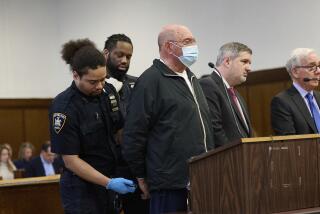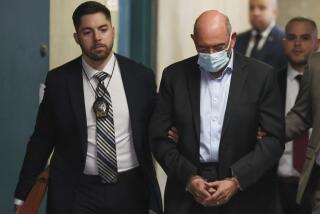Pastor’s fiery protest mystifies many
- Share via
ERFURT, GERMANY — The church was full so he did it outside, just after communion. Had a can of gasoline under his coat, drenched himself and went alight. The janitor saw a flash and yelled for help. The flaming man stumbled to the ground as worshipers rushed past and a nun knelt beside him, praying and touching a sliver of his unburned skin.
Someone said he whispered, “Is Jesus here?”
The Rev. Roland Weisselberg died the next day. His widow said the 73-year-old retired Lutheran minister committed suicide to protest Islam’s growing influence on a Christian continent that had lost its faith.
That’s all the bloggers and neo-Nazis needed. Screeds whirled and a troubled man was turned into a martyr, candles lighted in his honor, flowers dropped on the place where he fell.
“The motive of minister Weisselberg to burn himself to death shows the failure of multicultural policy,” proclaimed the website for Die Republikaner, an extreme right-wing organization. “There is no place for the Islamic faith in Germany.”
Terrorism and strains from integrating a growing Muslim population have transformed Europe into a cultural battleground. Weisselberg, a slight, fidgety man with a penchant for quoting poetry, fretted that Christians had forgotten God while Muslims were increasingly devoted. But his act on that final day of October, more riddle than signpost, has left friends and colleagues mystified over its interpretation.
“I feel as though we are digging in the fog,” said Elfriede Begrich, provost at the medieval St. Augustine Monastery, where the pastor poured gasoline over his body. “He’d never been a fanatic. He could get on your nerves at times, but he wasn’t a fanatic. We need to be careful. We don’t want to be blackmailed by him from the grave, ‘Now, you have to deal with Islam.’ ”
The Rev. Uwe Edom, who inherited Weisselberg’s suburban church when the older minister retired in 1989, said, “I don’t think he wanted confrontation with Islam. He just wanted Christians to live their faith more clearly.... But it is absolutely apparent that we have to deal with Islam in some way -- just look at the news each day.”
*
Special day
Weisselberg chose with care the day he would act: the anniversary of the Protestant Reformation, the day in the 16th century when Martin Luther nailed his treatise to a church door and broke with Roman Catholicism. Luther studied and took his vows at St. Augustine’s, and for many the monastery, with its black tower and arched gate, epitomized God’s designs for this city of spires and bells in deep Thuringia.
Other echoes from the past were heard that day. As his clothes smoldered, Weisselberg called out “Jesus” and then “Oskar.” The name is believed to be a reference to the Rev. Oskar Bruesewitz, a German vicar whose self-immolation in 1976 was a protest against East German communist oppression. But few knew what “Oskar” meant when the ambulance carried Weisselberg away, his lungs singed, more than 60% of his body burned.
It’s not an image you think of walking the tight lanes of Windischholzhausen, a village turned into a suburb at the edge of Erfurt. Weisselberg lived in a two-story A-frame with a pine tree out front and a wall laced with ivy. Around the bend, past the sounds of workmen and children, St. Michael’s, where Weisselberg was pastor for 25 years, rises over an orchard.
The church is small, with white lattice windows and a gray-shale steeple. The single tombstone in the graveyard has a mystery: Pvt. Heinrich Pfeiffer, born 1802, died 18--. The last two numbers have faded. Across the street, the glass-encased community bulletin board notes that the library bus comes on Friday. There’s also a sticker, not put up by village elders, but one that also has not been removed, that reads: “No to the Islamization of Europe. Germany for the Germans.”
*
A lot to say
Weisselberg did not want to resign as pastor, but a heart problem forced his retirement. A prattler who quoted verse from poets such as Rilke, the pastor began appearing at church and town meetings with a lot to say. Colleagues said he became consumed with Islam after Sept. 11, 2001. He wanted it as a topic at a retired ministers convention and mentioned it in his frequent letters to newspapers.
He seemed a man with too much time on his hands, bristling for ideological debate. People say he relished having the last word. Two pastors recalled that when Weisselberg presided at funerals, he made sure he was the last one standing over the grave, as if his prayers had a special ticket to heaven. He was whispered to more than once not to interfere when Edom replaced him at St. Michael’s; the older minister reluctantly receded so the younger could find his voice.
A black-and-white photograph of Weisselberg in his early 40s shows a smiling, balding man wearing thick black-rimmed glasses and a pastor’s frock. In the ensuing decades, he and his wife raised two children. He was gregarious and energetic -- he reportedly danced at a neighborhood street festival in July -- but revealed little of his personal life. An outspoken critic of the former East German regime, he watched as the clear lines of the Cold War shifted to an impassioned struggle to integrate imams, head scarves and Korans into a skeptical Europe.
“I remember once he said that Christians should have more rights in Saudi Arabia,” said Begrich, a quick woman sipping tea at dusk, thumbing through a binder of Weisselberg’s musings and stories written about him. “He complained about the growing number of mosques in Germany, but I don’t know if he knew a single Muslim. Only 1 or 2% of Erfurt’s population is Muslim.”
The newspaper Der Tagesspiegel reported that in a sermon in September, Weisselberg said, “A dark danger is stirred up by [Islam]. If the Christians don’t confront this in time, Europe will be flooded by this power.”
The minister, however, was not so easily categorized. It seemed to some that what bothered Weisselberg more was the erosion of Christianity; the faith that constituted his identity, that once filled the churches of Erfurt with hymn, was diminishing across his country. He felt, as one religious writer put it, that Christians could not be mere onlookers “when Jesus is crucified again and again but [should] stand beside him under the cross.... Otherwise, the church is doomed.”
In one letter to a newspaper, Weisselberg wrote of the controversy around the Mozart opera “Idomeneo,” which a Berlin theatrical company temporarily canceled for fear that a scene depicting the severed head of the prophet Muhammad might offend Muslims. The same production also showed the severed head of Jesus, and Weisselberg wondered why no one worried about offending Christians.
“He praised the cancellation of the performance and he waited for protests from the ranks of Christians,” Christine Laessig, editor of a Protestant weekly, Belief and Home, wrote of Weisselberg’s disenchantment. “It did not give him any peace that, in his eyes, his church -- not the church leadership but the community of faithful -- reacted so impotently and differently from the followers of Islam.... He was rather bothered by a militant atheism.”
The stained glass in the St. Augustine Monastery is amber, green and red; on a cloudy afternoon the candles give the best light.
Scraps of paper holding scribbled prayers are pinned near the door: “Give my husband a job so he doesn’t lose courage” or “Please allow no more wars. All my friends are buried here.” Someone left a note for a pastor: “Please God don’t let the sacrifice of reverend Weisselberg be in vain.”
*
Moving on
Frost puts a sheen on the grass; the garden soil is raw and winter-black. It’s been a few weeks, but workmen are back on scaffolds, clattering like crabs in a trap, except for Sundays, when hammers are quiet.
A man sweeps the courtyard stones. A fresh-cut evergreen lies on its side. It seems it might snow. The workmen are dusted and muddy, building a new religious library on the ruins of the library that a British bomb destroyed on Feb. 25, 1945, killing 267 people. It was in this construction pit that Weisselberg set himself on fire just after 10:45 a.m.
He never knew, but on that same day, a local radio station broadcast an interfaith discussion with Muslims, Christians and Jews.
*
More to Read
Sign up for Essential California
The most important California stories and recommendations in your inbox every morning.
You may occasionally receive promotional content from the Los Angeles Times.














